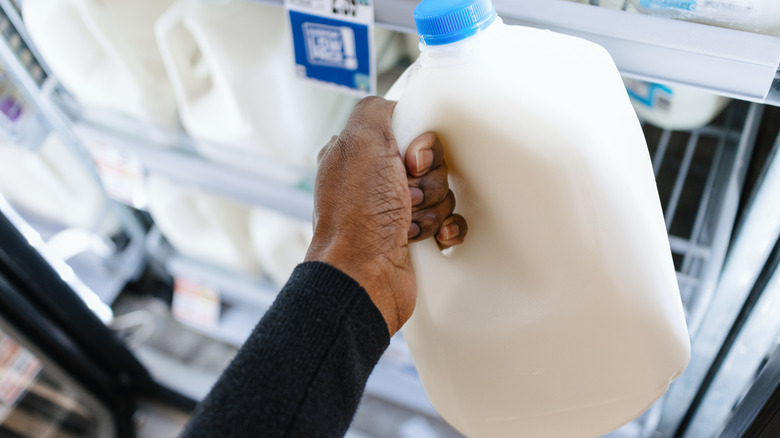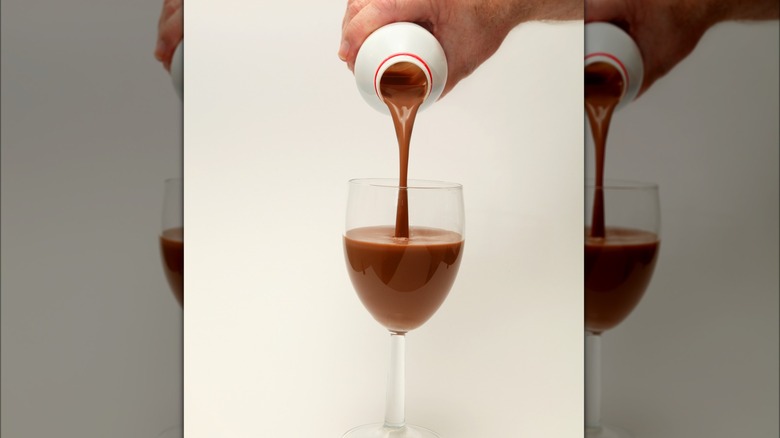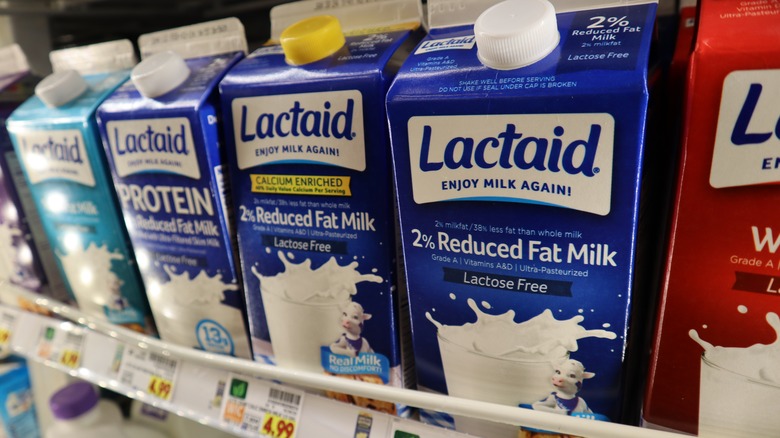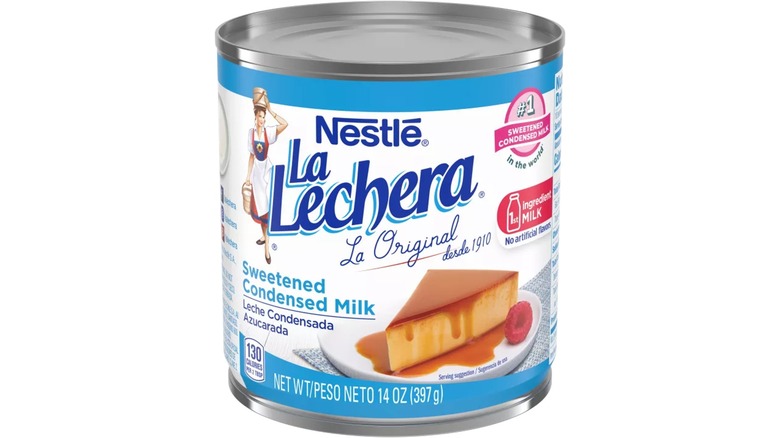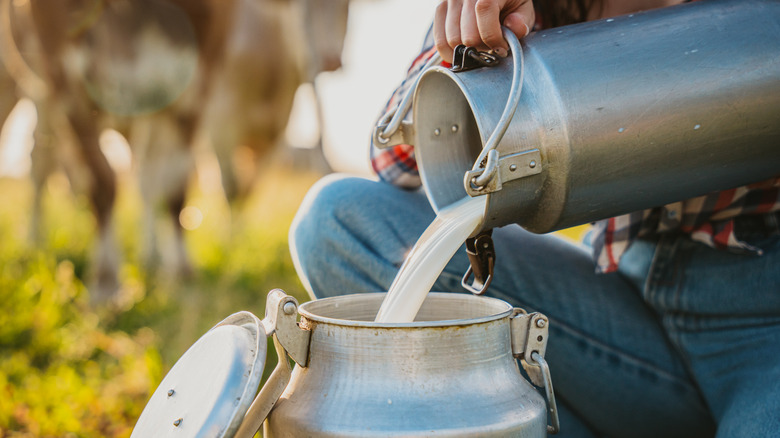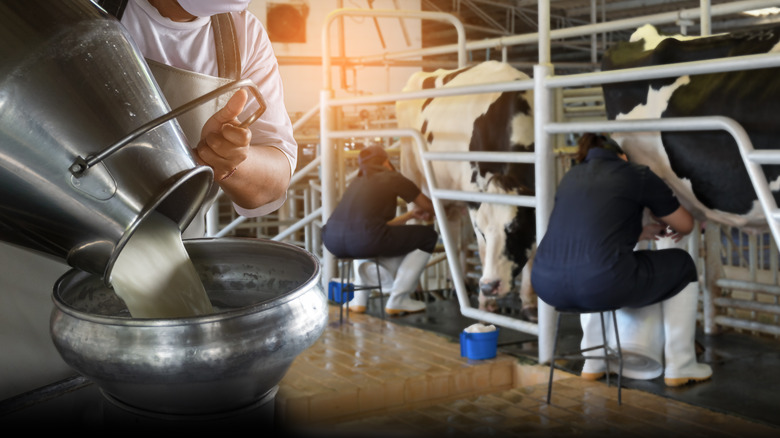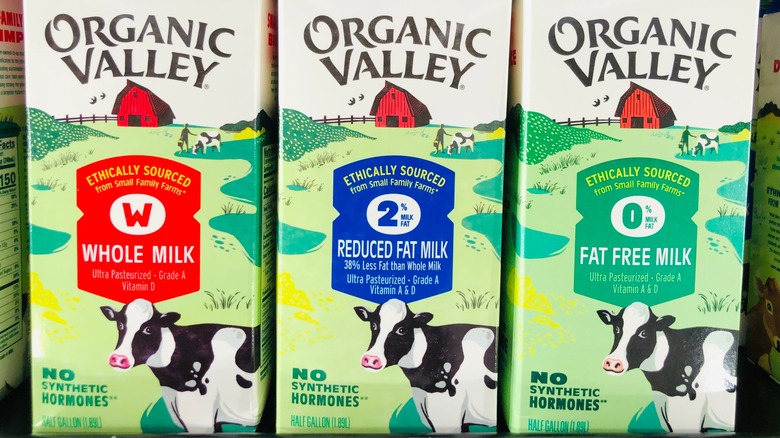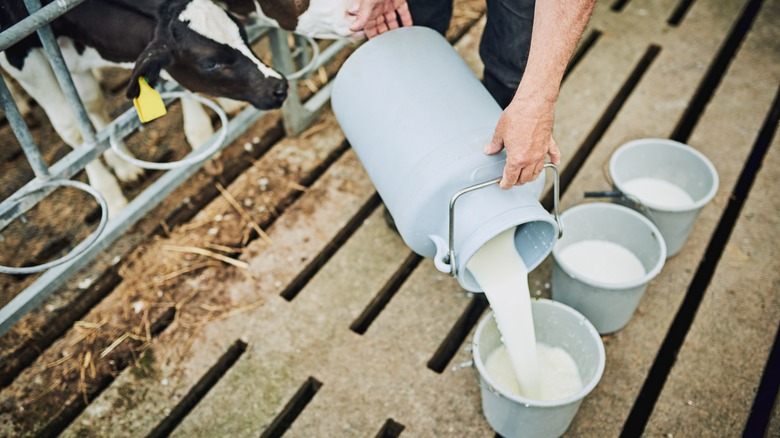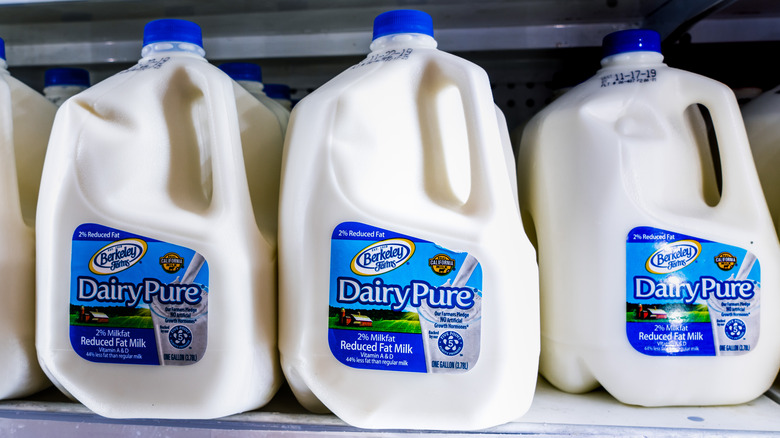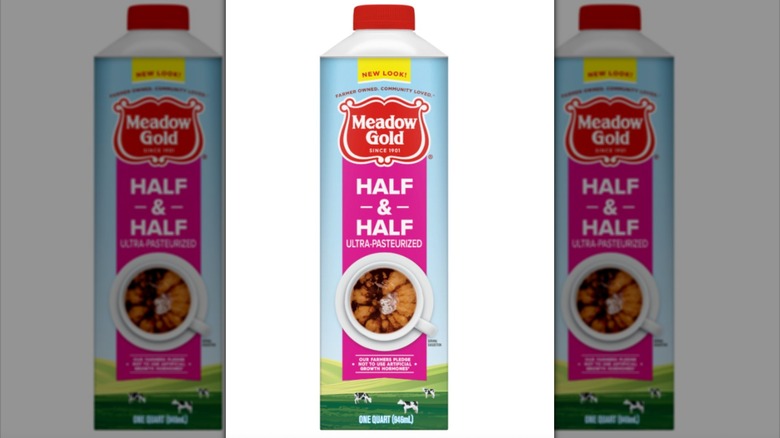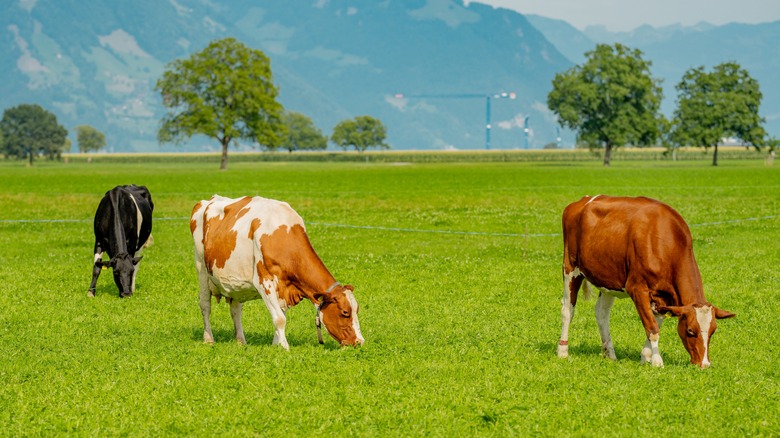The Biggest Milk Recalls Ever
Food recalls happen every year and can seemingly feel like they come out of nowhere. From bacteria to foreign objects to other contaminations, the reasons behind food recalls are fairly common. One of the best ways to stay up to date with current recalls is by checking your grocery store's website or by checking FoodSafety.gov, which lists recent recalls issued by the Food and Drug Administration (FDA) as well as the Department of Agriculture (USDA).
If you're interested in the history of recalls, you've come to the right place. We'll be discussing the biggest milk recalls ever. Although it's fairly difficult to dig into past recalls without scrounging up specific newspapers from the '80s or '90s or even earlier, we did our best to uncover some of the messiest moments of milk's past. Most recalls that we were able to get information on occurred after the year 2000.
When it comes to milk, there can be many reasons for a recall. Considering the fact that milk comes from a live animal and it naturally contains bacteria and other concerning germs that can be harmful to humans, it's already a delicate product to sell. Thanks to pasteurization and other cleaning methods to remove any harmful substances, milk can be sold at a large scale. However, mistakes happen, and many types of milk have been recalled over the years. Keep reading to learn about the biggest milk recalls that we could find.
2003 chocolate milk recall due to excess vitamins
The year 2003 saw the launch of MySpace, Shania Twain's Super Bowl performance, and a huge milk recall. That March the Ohio-based farm Reiter Dairy, which has been in business since 1933, had to recall a batch of its chocolate milk over what was believed to be a manufacturing error. Over 150 half gallons of the chocolate milk were recalled after officials determined it contained too-high amounts of vitamins A and D.
Now, a lot of recalls involve incredibly harmful substances, and some might not think that excess vitamins are something to worry about. But consuming too much of these vitamins can be dangerous. The levels listed on the packaging versus what the milk contained were quite stark. For example, it was listed that the milk had 400-600 International Units (IU) of vitamin D per quart when in reality it had 4,000 IU. The milk was also supposed to have 2,000-3,000 IU of vitamin A but in actuality had 44,700 IU.
Too much of a good thing can be harmful to anyone. Consuming excess amounts of vitamins can cause health issues, especially among those who are pregnant. Too much vitamin A can cause birth defects for a baby as well as hair loss, liver damage, headaches, and weakened bones at any age. Excessive amounts of vitamin D can cause nausea, vomiting, bone pain, and kidney problems, among other issues.
2024 Lactaid allergen recall
This recall was active in the United States at the time this article was written — and it's a big one! The Lactaid brand is popular among people who are lactose intolerant. Lactaid uses milk from cows that is treated with an enzyme that breaks down the lactose, making it easier to digest.
In September 2024, trace amounts of almonds were found in 96-ounce containers of Lactaid milk shipped in early- to mid-September. These shipments made their way to 27 states. No illnesses have been reported so far. It seems that the issue was found during a routine maintenance check.
Even though there were only trace amounts of almonds found in the milk, that is extremely concerning. For people who have tree nut allergies, any sort of contamination could lead to a reaction and in some cases anaphylaxis. Generally, milk wouldn't be a substance that someone would even think could have traces of tree nuts. It's extremely unfortunate that this contamination happened; however, the FDA and Lactaid did a great job at finding and resolving the issue immediately.
1991 Nestle recall after drug contamination
In California, at least one family got much more than they bargained for when consuming condensed milk made by Nestle. The product was specifically the La Lechera sweetened condensed milk, and what was found in this milk was actually horrifying. It turns out that it contained PCP, also known as angel dust in the illegal drug market. PCP is a mind-altering drug that causes hallucinations, dissociations, and other high-like effects.
The March 1991 recall was prompted when a family became sickened after using the condensed milk in some rice pudding that they had made themselves. A woman, her daughter, and her two grandchildren were found nearly comatose — the children, who were 7 months old and 3 years old at the time, were hospitalized for five days. For anyone to consume this drug, it can be very dangerous — but for extremely young children, we can't imagine how traumatizing that must have been. To think that a dangerous street drug made its way into a packaged, store-bought item is unfathomable. The company was never sure how the condensed milk became contaminated, and no other incidences were reported. To be safe, Nestle put out a nationwide recall for over 480,000 cans.
2022 New York raw milk recall
Most milk that we consume is pasteurized, which means that it's heated to a certain temperature that kills any harmful bacteria before it can be consumed. Raw milk, however, is not pasteurized. It's said that there are great health benefits to raw milk, like fewer allergies and improved respiratory health. Some people also prefer the taste of raw milk versus pasteurized. Manufacturers produce raw milk under specific hygienic conditions that ensures the milk is safe to consume. It's then tested for harmful bacteria and sold once it's cleared. However, mistakes can happen.
The Eric and Jessica Nickol Farm in upstate New York was found to have Listeria in its raw milk in November 2022. Listeria is a type of bacteria that causes serious health issues that may not develop until 70 days after exposure. People who are infected usually start out with symptoms similar to a stomach flu, but then the bacteria can spread and infect the blood or the brain. It's definitely not a type of infection that you'd want to get.
When the Listeria was found, the New York State Department of Agriculture and Markets warned customers not to consume any raw milk produced by the farm until tests confirmed it was safe. The farm was prohibited from selling any of its raw milk until it could prove through further testing that the milk was free from any harmful substances. There is always a risk taken when consuming raw milk, and this finding of Listeria proves that.
2022 school milk carton contamination
This incident is one of the worst recalls we've seen. In 2022, milk companies Garelick Farms and Guida's Dairy discovered that some of their milk cartons were contaminated with sanitizer. The biggest issue about this contamination? These cartons of milk, a school lunch staple, were shipped directly to schools in New Jersey and Massachusetts to be consumed by children.
In New Jersey, about 28 children were transported to the hospital for evaluation once the news of the contamination was shared. One preschool in Camden, New Jersey, that teaches 3- to 5-year-olds had multiple children become sick after ingesting the milk. Luckily, all of the children were later released. In Massachusetts, some students noticed that the milk had a strong smell of bleach.
Officials reported that the two milk companies were part of the same dairy cooperative, and all cartons of potentially contaminated milk were removed from schools. In an interview with CBS News, Garelick Farms said, "We immediately took action to retrieve any potentially affected product and began testing this product to verify there is no food safety risk associated with this product. After a detailed review, it was determined that food-grade sanitizer diluted with water was introduced during production of a limited number of Dairy Pure 1% low-fat half-pint cartons."
2022 Next Generation Farm salmonella outbreak
We all know about the concerns of salmonella contamination, as the act of washing your hands after handling raw chicken or eggs has been ingrained in most of us since we learned how to cook so that we avoid food poisoning at all costs. Most people, however, don't think that milk could be the culprit of salmonella poisoning. In 2022, however, Next Generation Farm in New York was found to have salmonella in its raw milk. Upon this finding, the farm was banned from selling any raw milk until it was able to prove that the product was free from salmonella or other harmful substances.
Salmonella poisoning can be incredibly dangerous. Most people experience flu-like symptoms, like vomiting, diarrhea, fever, and abdominal pain. People with weakened immune systems, like younger children, the elderly, and pregnant or immunocompromised people, can have fatal infections. It's something to take seriously, and we're so glad that the New York State Department of Agriculture and Markets found this contamination. Thankfully there were no illnesses reported related to this recall.
The tricky thing to remember about farms that sell raw milk is that although they test their own milk for traces of bacteria or other harmful organisms, it isn't always foolproof. The findings of contamination are almost always found by state officials, not the seller, after the milk has been sold.
2022 microbial contamination with Oatly and Organic Valley
2022 strikes again with yet another recall of nutritional and beverage products, including milk. This one, however, hits a little closer to home with a brand that many people are familiar with. Among contamination in a slew of different products from various brands was Organic Valley milks. The company's organic whole milk, 1% regular milk, and 1% chocolate milk was affected.
The reason for this recall was microbial contamination, which included the organisms Cronobacter sakazakii and Clostridium botulinum. Now, most people don't know what those organisms are — but the FDA is quite aware. They both can cause awful sicknesses — like fever, vomiting, and urinary tract infections (for Cronobacter sakazakii) and slurred speech, blurred vision, muscle weakness, and difficulty swallowing (for Clostridium botulinum).
The cause of this contamination was due to the products not meeting the standards for commercial sterility, according to the FDA. This was a large recall that affected nearly 90 various products amongst 22 brands — like Lyons, Optimum Nutrition, Ensure Harvest, Pediasure Harvest, Oatly, and more. Although this recall began in July of 2022, there were many items on the recall list that had expiration dates way into 2023. Fortunately, no illnesses were reported.
2022 New York dairy farm shutdown from Listeria
There are many raw milk farms throughout the country that people rely on, yet the FDA and the Centers for Disease Control and Prevention (CDC) do not approve of the consumption of raw milk due to potential safety concerns. Many of the recalls involving raw milk have proven the agencies' concerns to be true.
A farm in New York called Thomas Miller DBA Miller Dairy Farm had an issue with Listeria monocytogenes contamination in 2022. An inspector from the New York State Department of Agriculture and Markets found traces of the harmful bacteria in a sample tested from the farm's raw milk. After the finding, the farm was prohibited from selling its raw milk products until it had proof that subsequent contamination was no longer present.
Fortunately, no illnesses were reported from this Listeria contamination — however, some cases of Listeria can take up to 70 days from the date of exposure to the appearance of symptoms. Considering this, many people may not link their illness to raw milk they consumed potentially two months prior to the sickness. Listeria can be fatal, especially for the immunocompromised, pregnant women, and people over the age of 65. It's important to remember the risks that are present when consuming raw milk.
2002 Berkeley Farms penicillin contamination
When most of us think of penicillin, we think of that thick, pink medicine we had to take as children. Not many people think that they'd find penicillin in their milk, but back in 2002, it happened. Berkeley Farms, which is located in California, had been operating since 1910 and ended up closing in 2020 after its parent company Dean Foods filed for bankruptcy.
At the time of the recall, Berkeley Farms sourced its milk from other independent dairy farms. It's common practice for farms to give cows antibiotics for health reasons; however, it's important that no antibiotics make their way into the milk. That's not what happened in this case. Somehow, penicillin made its way into the milk and got through quality testing before hitting the market. Once the antibiotic was detected, all of the Berkeley Farms milk products were taken off the grocery store shelves and the recalls were issued. There were multiple batches that were involved with the recall, spanning about a week's worth of expiration dates.
Penicillin is a common antibiotic that prompts allergies in some people. Symptoms can go from hives, swelling, and wheezing all the way to anaphylaxis. It could be potentially life-threatening if the person affected doesn't receive treatment right away. Luckily, no illnesses or issues were reported.
2016 Meadow Gold recall
Meadow Gold is a company that sells an entire line of milk products in grocery stores. In 2016, its milk was found to have undergone insufficient pasteurization, which opened the possibility of pathogens. Now, as we've seen, farms that sell raw milk don't pasteurize their milk, which can be very dangerous. Most people, however, drink pasteurized milks, and that's what is sold in grocery stores. If an FDA-approved milk that's on grocery store shelves is found to not have been pasteurized sufficiently, that's a huge problem.
This recall involved about 10,000 units of the product, including Dairy Pure half and half and whipping cream. The products had been distributed in four states: Idaho, Oregon, Wyoming, and Utah. Apparently, Meadow Gold had found the issue during a routine check. Luckily, the company caught it very quickly. There was major concern that bacteria and other organisms like salmonella, E. coli, and Listeria were contaminating the products.
Meadow Gold is still a very large dairy producer today and focuses on the welfare of the cows, the environment, and its customers. It is very telling that the company itself was the one who found the issue in the products, as opposed to a federal agency like the other recalls on our list. A standard is clearly upheld with this company, which is great to see.
2006 Organic Pastures E. coli outbreak
Organic Pastures Dairy Company is a farm in Fresno, California. This is another raw milk farm, and it's a quite popular one at that. This family farm began making dairy products in the late '90s, and it had a very pure and positive intention. Organic Pastures has a huge focus on the well-being of the cows — they are treated humanely, have free roaming of the pasture, and are fed a natural diet. Even though this farm has great intentions, there have been quite a few recalls in its history – 13 separate recalls since the year 2006.
The very first recall in 2006 for Organic Pastures was due to E. coli being found in the raw milk. Sadly, it affected six children between the ages of 6 and 18, three of whom were hospitalized due to ingesting the infected milk. An E. coli infection typically includes diarrhea, but there are many other symptoms depending on the type of E. coli infection you have. There were two children who were hospitalized with a severe condition linked to the infected milk, called hemolytic uremic syndrome — which can cause acute kidney injury.
There is actually a video on YouTube of a child who was affected by the 2006 E. coli outbreak. He is shown in the hospital using a breathing apparatus, and once he was healed, he wasn't able to speak because of damage to his vocal cords. The video shows just how serious this contamination in the milk was.
